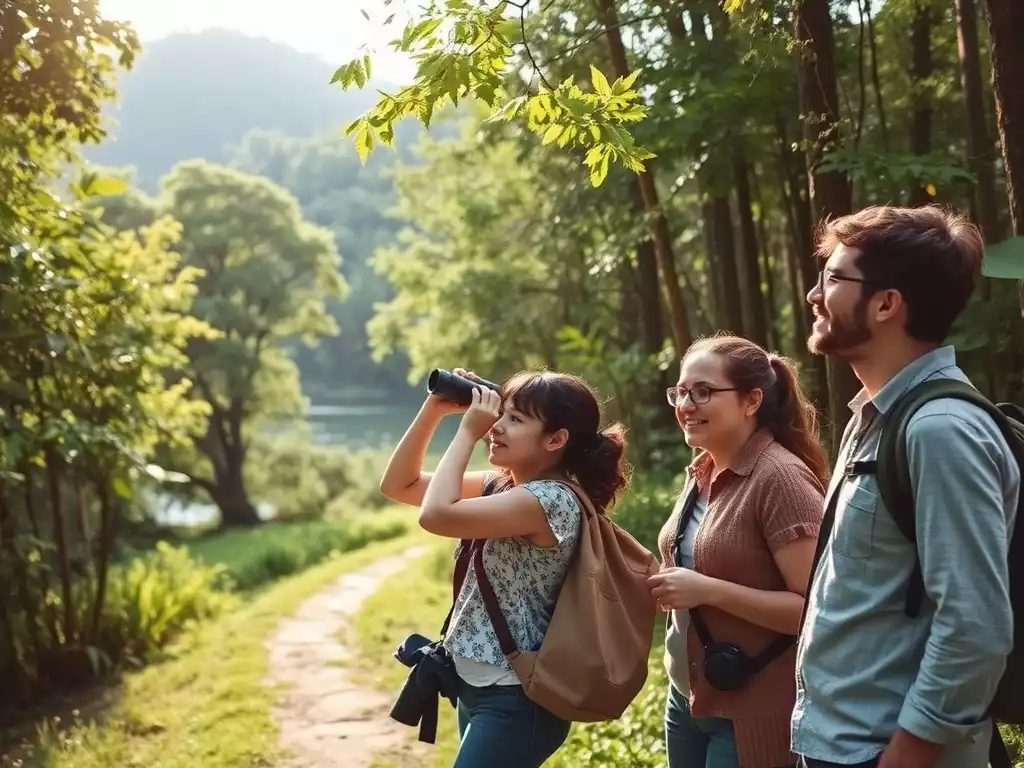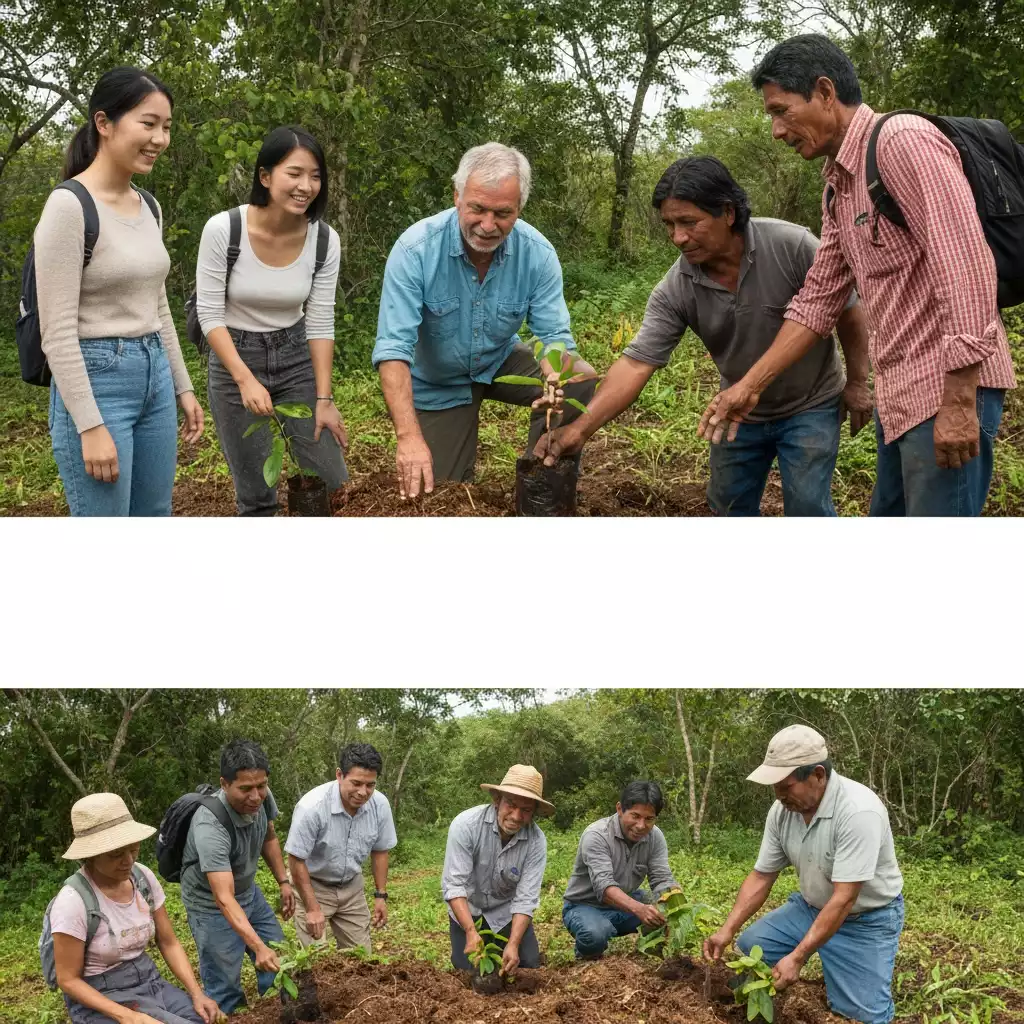Are you ready to transform your travel experiences into a force for good? Eco-tourism not only offers breathtaking destinations but also empowers travelers to make meaningful contributions to the planet and local communities. Here’s how you can elevate your adventures while preserving the beauty of our world!
What You Will Learn
- The core principles of eco-tourism: conservation, education, community involvement, and responsible travel.
- How eco-tourism supports sustainable travel by reducing carbon footprints and funding conservation efforts.
- The positive impact of eco-tourism on local economies, cultural heritage, and biodiversity.
- Essential tips for creating your eco-travel checklist to prepare for sustainable adventures.
- Ways to engage with local communities and learn about traditional ecological knowledge during your travels.
- How to be a responsible traveler by minimizing your environmental impact and supporting local businesses.
- Opportunities to participate in eco-tourism conferences and community initiatives to deepen your understanding and impact.
Understanding Eco-Tourism and Its Importance
Eco-tourism has become a vital component of the travel industry, emphasizing responsible travel to natural areas. It aims to conserve the environment and improve the well-being of local people. In my travels, I’ve learned that eco-tourism is not just about visiting breathtaking landscapes; it’s about respecting and protecting those places while enjoying their beauty.
The principles of eco-tourism revolve around sustainability, conservation, and cultural respect. By choosing eco-friendly practices, travelers can make a positive impact on the environment and local communities, ensuring that these beautiful destinations remain for future generations to enjoy. For instance, initiatives like those supported by the World Bank encourage sustainable and inclusive tourism in protected areas, fostering green recovery and long-term preservation.
Defining Eco-Tourism: Principles and Practices
At its core, eco-tourism is defined by its commitment to minimizing tourism’s impact on the environment. This includes various practices that honor natural habitats and promote environmental education. Below are some key principles that guide eco-tourism:
- Conservation: Protecting natural resources and wildlife.
- Education: Raising awareness about environmental and cultural issues.
- Community Involvement: Supporting local economies and empowering residents.
- Responsible Travel: Encouraging behaviors that reduce harm to the environment.
By adhering to these principles, we can travel in a way that genuinely supports the places we visit. Eco-tourism encourages us to appreciate the beauty of nature while ensuring its preservation.
The Role of Eco-Tourism in Sustainable Travel
Eco-tourism plays a crucial role in promoting sustainable travel. It not only allows travelers to connect with nature but also emphasizes the importance of environmental stewardship. Here’s how eco-tourism contributes to sustainable practices:
- Reducing Carbon Footprint: Eco-friendly travel options often mean lower emissions.
- Supporting Local Economies: Funds generated from eco-tourism go back into communities.
- Conservation Efforts: Eco-tourism helps fund preservation projects and wildlife protection.
As travelers, we have the power to drive change through our choices. By opting for eco-tourism, we’re not just enjoying our trips but actively participating in the sustainability movement. Organizations like the Global Sustainable Tourism Council (GSTC) highlight the importance of these efforts in their annual reports, showcasing progress and future goals for sustainable tourism worldwide.
The Impact of Eco-Tourism on Local Communities and Biodiversity
The positive effects of eco-tourism extend beyond the environment to local communities and biodiversity. When done correctly, eco-tourism can create a harmonious balance between nature conservation and community development. Here are some of the benefits:
- Job Creation: Eco-tourism creates jobs in local areas, fostering economic growth.
- Preservation of Cultural Heritage: It encourages the celebration and sharing of local traditions.
- Wildlife Protection: Eco-tourism initiatives often include conservation programs that protect endangered species.
Through eco-tourism, I’ve seen firsthand how communities thrive while preserving their natural and cultural heritage. Each visit contributes to a larger movement of respect and sustainability. The economic contributions of national parks, for example, demonstrate the significant impact of nature-based tourism on local economies, supporting numerous jobs and billions of dollars in economic activity.
We Want to Hear From You!
What has been your most memorable eco-tourism experience? Share your thoughts below:
Taking Action: How to Start Your Eco-Tourism Journey
Are you ready to embark on an eco-tourism adventure? It all begins with preparing yourself for the journey ahead. By creating an eco-travel checklist, you ensure that you pack not just for your comfort, but also for the planet! Let’s dive into some essential tips that will guide your eco-friendly travel planning.
Creating Your Eco-Travel Checklist: Essential Tips
Your eco-travel checklist is crucial for a sustainable journey. Here’s what I recommend including:
- Reusable items: Bring your own water bottle, utensils, and shopping bags.
- Eco-friendly toiletries: Choose biodegradable soap, shampoo bars, and bamboo toothbrushes.
- Clothing choices: Pack lightweight, quick-dry clothes that are versatile and sustainable.
- Nature-friendly gadgets: Consider solar-powered chargers or e-readers to minimize paper use.
By following this checklist, you’ll not only travel smart but also show respect for the environment. Think about how your choices influence the communities you visit—this adds a personal touch to your travels!
Real Traveler Stories: Witnessing the Impact of Eco-Tourism
Hearing real stories from fellow travelers can be incredibly inspiring! Many have shared their experiences in eco-tourism that showcase its positive effects:
- Community projects: Travelers participating in local conservation efforts have seen firsthand how their support helps preserve natural habitats.
- Empowering locals: Some travelers have helped empower local artisans by purchasing handmade crafts directly from them.
- Learning experiences: Engaging with local guides often leads to deeper understanding and appreciation of cultural heritage and environmental issues.
These stories not only motivate us to take action but also remind us that our travel choices can lead to meaningful impacts!
Learning about Cultural Heritage and Traditional Ecological Knowledge
Understanding the cultural heritage of the places we visit enriches our travel experiences. By embracing traditional ecological knowledge, we can learn sustainable practices passed down through generations. Here are some ways to deepen this understanding:
- Participate in local workshops: Engage in traditional crafts, cooking classes, or sustainable farming practices.
- Visit historical sites: Explore places that highlight the connection between local communities and their natural surroundings.
- Connect with indigenous communities: Seek opportunities to listen to their stories and learn about their ways of life.
These experiences can foster a greater respect for both nature and the cultures that inhabit it, making your eco-tourism journey even more rewarding!
Join the Movement: The Future of Sustainable Travel
As we look toward the future of sustainable travel, it’s important to consider our role in the eco-tourism movement. Every traveler can make a difference by practicing responsible tourism and advocating for sustainable practices. Let’s explore how you can actively participate!
Understanding Your Role in Eco-Tourism: Being a Responsible Traveler
Being a responsible traveler means making conscious choices that benefit the environment and the communities you visit. Here are some key points to keep in mind:
- Leave no trace: Always clean up after yourself and minimize your environmental footprint.
- Support local businesses: Choose to eat at local restaurants and shop at farmer’s markets.
- Respect wildlife: Observe animals from a distance and adhere to guidelines when visiting natural habitats.
Your actions can inspire others to follow suit, creating a ripple effect of positive change in the travel community!
Call to Action: Start Planning Your Sustainable Adventure Today
Are you excited to make a difference through your travels? It’s never too late to start planning your sustainable adventure! Research eco-friendly destinations, book accommodations that prioritize sustainability, and prepare yourself for an enriching experience.
Make sure you share your plans with friends and family—who knows, you might inspire them to join you on this journey!
Participating in Ecotourism Conferences and Community-Based Initiatives
Getting involved in eco-tourism conferences and community initiatives can greatly enhance your understanding of sustainable practices. Here are some ways to participate:
- Attend workshops: Gain insights from experts in sustainable travel and conservation.
- Network with like-minded individuals: Connect with other eco-travelers and share experiences.
- Volunteer: Offer your time to local organizations focused on conservation and community development.
By participating actively, you contribute to a global movement for sustainable travel while also enriching your personal travel experiences!
Frequently Asked Questions About Eco-Tourism
What is eco-tourism?
How does eco-tourism contribute to sustainable travel?
What are the benefits of eco-tourism for local communities and biodiversity?
What should be on an eco-travel checklist?
How can travelers be more responsible in eco-tourism?
Recap of Key Points
Here is a quick recap of the important points discussed in the article:
- Eco-tourism Principles: Emphasizes conservation, education, community involvement, and responsible travel.
- Sustainable Practices: Reduces carbon footprint, supports local economies, and funds conservation efforts.
- Community Benefits: Creates jobs, preserves cultural heritage, and protects wildlife through eco-tourism initiatives.
- Eco-Travel Checklist: Include reusable items, eco-friendly toiletries, and nature-friendly gadgets for a sustainable journey.
- Engagement with Local Culture: Participate in workshops and connect with indigenous communities to enrich your travel experience.
- Being a Responsible Traveler: Leave no trace, support local businesses, and respect wildlife during your travels.


